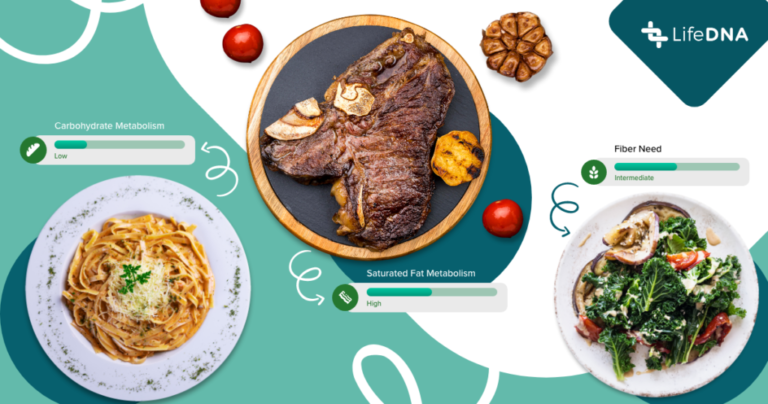Genetic testing for nutrition and food allergies
Aira
on
February 10, 2023
Genetic testing for nutrition and food allergies

While you may not experience it first-hand, you most likely have witnessed someone or know someone who has allergies. Allergies, in general, are the body’s immune response to certain environmental factors that are otherwise harmless to other people. These triggers are known as allergens and can come in the form of food, dust mites, pollen, animal hair, medication, and others. This immuno-response may vary from mild and manageable to severe and life-threatening.
What is Food Allergy?
Food allergens elicit the same response from your immune system if your allergies are triggered. Depending on how allergic you are to a particular food, even the tiniest amount of it can trigger allergic reactions. Food allergies can occur almost immediately and up to 2 hours after an individual has eaten an allergen.
The Role of Genetics in Food Allergies
As many studies have shown, food allergies can be genetic. Your DNA can impact your likelihood of developing allergies toward peanuts, peaches, and even shrimps.
Genetic testing for nutrition
Thanks to technological advances, people can now get a personalized nutrition DNA analysis to see if they are susceptible to food allergies. LifeDNA can provide a full and comprehensive Nutrition Report that includes insights on food allergies and sensitivities, vitamin deficiencies, and other wellness factors based on your DNA.
Food Allergy Management via Nutritional Genetic Testing
Genetic testing for food allergies can give you the advantage of managing them effectively.
LifeDNA uses the most advanced laboratory technology and the latest research to give you a comprehensive Nutritional Report that includes insights into your food allergies and your likelihood of developing them. Plus, personalized lifestyle optimizations on how you can manage your risk. LifeDNA’s diet and health pack include a full Nutrition Report which includes 40 unique trait reports including:
Peach Allergy
Peanut Allergy
Shrimp Allergy
Sodium Sensitivity
Gluten Sensitivity
Sugar Preference
Satiety
Antioxidant Status
…and many more!
If you’re ready to get personalized insights into your DNA, get your Nutrition Report today.

Today, we’ll answer some of the most common questions about certain food allergies:
What is peanut allergy?
Peanut allergy is one of the most common causes of anaphylaxis. While commonly mistaken for tree nuts, peanuts are actually part of the legume family. They are grouped together with lentils, beans, and soy. A peanut allergy happens when your immune system sees peanut proteins as harmful substances to the body and violently reacts to counter them.

Why are peanut allergies so common?
Millions of children suffer from peanut allergies but adults can also have them. While studies show that over 20 percent of children outgrow this food allergy, its effects can still vary from mild to severe.
Are peanut allergies genetic?
One study showed that some parts of the DNA harbor genes that are linked to peanut allergies. This study suggests that these genes pose a significant genetic risk from parent to child, although no conclusive data are available to this day as research continues.
Peanut Allergy Test
Peanut allergies can be detected via a blood test called an immunocap radioallergosorbent (RAST). This test checks the number of immuno-response cells in your blood called antibodies. The higher the antibodies after a controlled food intake, the higher the chances you might be allergic to it.
What is peach allergy?
Peaches belong to the family of apricots, cherries, plums, and almonds. Their edible flesh is sought-after because of their sweet-tangy taste. However, some are allergic to peaches. The two types of peach allergies are those that have birch-pollen allergies and those that have non-birch-pollen allergies.
Birch-pollen allergies are caused by the body mistaking peach protein similar to birch protein which causes birch-pollen allergies. This type of protein cannot survive heat and cooking so people with this type can eat cooked or processed peaches.
Non-birch-pollen allergies are caused by eating the flesh and peel which contains a protein present in peaches. They are tough and can survive heat, thus, people with this type of allergy cannot consume peaches in any form.

Peach allergy symptoms
Like most food allergies, symptoms of peach allergy can vary from mild to severe. They also include symptoms such as rashes, gastrointestinal problems, and anaphylaxis. Peach allergy may also include symptoms of Oral Allergy Syndrome (OAS) including an itchy mouth, swollen tongue, and scratchy throat.
Peach Allergy Test
A peach allergy test can be done via a skin test or blood test. An oral challenge is making the patient take a certain amount of peaches and then test for antibodies. This is only done for those without severe allergic history to peaches. The prick-prick test is also another test; it is done by pricking a lancet into a peach and pricking the same lancet through the individual’s skin. Any adverse reaction will merit a positive result in peach allergies.
What is shrimp allergy?
Shellfish allergy is an allergy to proteins in certain edible marine animals such as crustaceans and mollusks. These include crabs, shrimps, lobsters, squid, oysters, scallops, and other shellfish. Symptoms may also vary from mild to severe.

Shrimp Allergy Test
Allergy testing for shrimp allergy can be done the same way as peach allergy testing. A blood test or skin prick tests are two options widely available for shrimp allergy test results. The process is the same; either oral intake of shellfish and then a blood test for antigens or prick shellfish proteins and prick the human skin for any reactions.
When to see a doctor
Food allergies are more common than you might think. If any allergic reaction takes place after eating a certain food, immediately take note of its intensity and take due course of action. See your primary care physician if these symptoms start to manifest more frequently or if they increase in intensity. Emergency cases such as anaphylaxis should be treated immediately and given first-aid medications such as epinephrine injections.
*Understanding your genetics can offer valuable insights into your well-being, but it is not deterministic. Your traits can be influenced by the complex interplay involving nature, lifestyle, family history, and others.
Our reports have not been evaluated by the Food and Drug Administration. The contents on our website and our reports are for informational purposes only, and are not intended to diagnose any medical condition, replace the advice of a healthcare professional, or provide any medical advice, diagnosis, or treatment. Consult with a healthcare professional before making any major lifestyle changes or if you have any other concerns about your results. The testimonials featured may have used more than one LifeDNA or LifeDNA vendors’ product or reports.





































